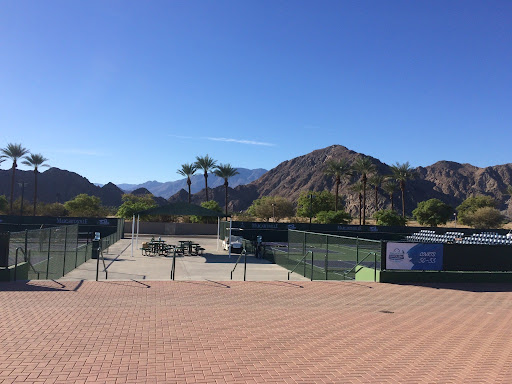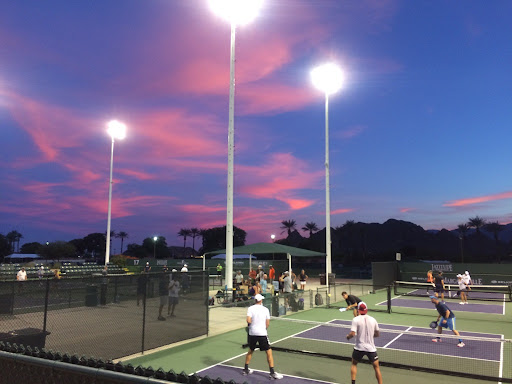Tournaments are a great way to play competitive pickleball while also increasing the social aspect of the game. The great thing about tournaments is that they are available to everyone, not just professionals.
This blog post delves into my own first tournament experience and I'll also provide some tips for preparation, nutrition, and more...
Before anything else in pickleball, I was first a player and will likely never forget my first tournament experience...
It was the 2016 Pickleball Ontario Provincial Championships in Markham, Ontario. I only registered for one event: mixed doubles 19+ 3.5 skill level. Previous to this tournament my partner and I had only played on a rubberized floor on a court that was eight feet too short.
We had managed to really play at the non-volley line but to make up for the lacking length, we added about two feet of width, thinking this was a smart move.
Overall, I stand by this decision because we were only playing at the kitchen, but it seriously impacted our serves and the angles we were able to achieve because of this additional width; it also, of course, affected our third shot drops, but I don’t think we understood the impact of an effective third shot drop until after this tournament.
What I’ll never forget is the first serve of our semi-final match. The referee called a service fault because I served before the score was called out. It rattled me big time and we never really found a rhythm that whole match.
In hindsight we should have taken a timeout, but who knew? We certainly didn’t have a coach or a mentor in the sport at that point. In fact, we were the ones introducing others to the game. Here’s a breakdown to help you conquer your first pickleball tournament.
 Photo credit: Sara McInnes
Photo credit: Sara McInnes
Equipment
Before you actually play in a tournament, be sure that you have a paddle that you are familiar with and love using. Breaking in a paddle has less of an effect than let’s say a broken-in baseball glove. Most paddle cores are made of plastic honeycomb and can, over time, start to break down and lose their “pop” or power.
A fresh paddle is great if you’ve previously used that specific kind before, but trying out a brand new paddle can definitely throw you off your game. Each paddle plays differently and it can take some players a while to get a “feel” for their stick. It certainly doesn’t hurt to carry a spare paddle in your bag either.
Other equipment of importance - during the tournament - are solid court shoes that will support the lateral movements of the game, safety glasses (highly recommend), and definitely a bag that will hold all of the excess gear plus food and water. If you’re like me and replace overgrips quite often, grab a few extra rolls and drop those into your bag.
I also carry electrolytes, extra clothes (especially socks), sweatbands or a towel, and a hat. There are a couple of entertaining video clips of pros showing off what they carry in their equipment bag, be sure to search for those as they might include additional suggestions on what to bring for your first tournament.
 Photo credit: Sara McInnes - 2018 Tournament of Champions, Waterloo, ON
Photo credit: Sara McInnes - 2018 Tournament of Champions, Waterloo, ON
Know the Rules
Each year USAP and IFP, the two major governing bodies in pickleball, refresh the rules. So far, they haven’t made major changes like the scoring system but that’s not to say they won’t. The most recent and significant changes are allowing a “drop serve” and removing the “let” rule.
It’s very important to understand and familiarize yourself with the majority, if not all rules of the game; and don’t pull a “me”! I knew about the serving fault yet I still committed the fault, based on inexperience and nervousness.
If you do not have a coach, take the time to read the free digital rulebook or scope out the many YouTube videos that explain most of the recent rule changes. If you have a coach, they will explain anything that you don’t understand and/or should prepare you leading up to your first tournament.
Most tournaments are self-referred until the medal matches unless you request a referee. This means, during self-refereed matches you and your teammate call the score when you’re on the serving team and make your own line calls. You can call the other team for foot faults and service errors.
For any type of discrepancy that cannot be resolved amongst the four of you (or two, if it’s singles), you must ask for the head referee to help resolve the issue. Requesting a ref is more common than one would think, I’ve seen it done if a team feels like it’s necessary to do so, they might want an extra set of eyes on the non-volley line, or for other reasons.
A referee will introduce themselves and explain the format of the match. They will cover the housekeeping items such as clarifying how many times-outs each team receives and how much warm-up time is given before the match begins.
I have entirely accepted my semi-finals experience, however, I will mention that the referee did not run through the housekeeping items, including, reminding us that they would call out the score before each serve.
Hydration
My soccer coach used to say right before the start of a match “if you’re thirsty then you’re too late”. While it wasn’t particularly helpful to hear in the moment, this saying certainly stuck with me as I continued through the years of competitive soccer and it’s something that crosses my mind all the time, when preparing for pickleball practice or competition and I’ve carried it into my own coaching repertoire.
Hydration takes more than a few glasses of water before playing. Depending on how dehydrated you are, it can take days of increased water intake to properly prepare yourself for extended activity. Consuming drinks that boost hydration are a definite must while competing.
Amateur pickleball tournaments are unique in the sense that entire categories are played in one day and if you’re like most players, you’re entering more than just one category. So, within one weekend, you might spend more than fifteen hours at the venue. It doesn’t take much for a person to become slightly dehydrated and it’s often detected far too late.
Dehydration can cause confusion and low energy, things we want to avoid! Make sure to remember that the recovery process is just as important as preparation and sustainability. I personally use Bio-Steel and Nuun tablets to replenish electrolytes and minerals (but I’m not endorsed by either company) as they are both low in sugar, unlike some of the more familiar, sugary drinks.
Nutrition
That first tournament, for some reason, my mixed partner and I forgot to bring food with us. It was a… moment. A very inexperienced moment. Fortunately, we were saved by the very team who we ended up playing in the semi-finals. They had two full coolers of food and graciously shared their food with us.
As previously mentioned, sometimes tournament days are long and full of breaks where you can stop for a sandwich, and other times categories move quickly and you only have time for a few bites of a banana. Either way, it’s important to be food prepared. My go-to’s are chicken wraps, protein bars, and bananas.
The night before competition I have a well-rounded meal. It's been known for players to have a pregame traditional meal or snack (Ice cream? Fried chicken? You know who you are!)

Photo credit: Sara McInnes - Indian Wells, home of the 2018 USAP National Championships
Be in the Know
Knowing which day(s) you play and the start time is of obvious importance but it’s advantageous to know as much as you can ahead of time. Read the multiple emails the tournament directors send out leading up to the tournament which usually includes parking details, registration instructions, category formats, and brackets.
Each tournament will be a different format, most will be round robin with playoffs or double-elimination (meaning, losing two matches will eliminate a team). Know what type of surface you’ll be playing on so you can try to practice on a similar surface and know what type of ball is being used so you can practice with it. Playing outside will mean bringing different items such as sunglasses, a hat, and sunblock.
When I travel outside of Ontario for a tournament I do my best to find out if the venue can provide courts for practice before the tournament and during. The first time I travelled to Indian Wells for the USAP National Championships I was surprised to find out that there are no courts available for teams to practice during competition.
There are almost fifty courts and they’re all taken up, so during the day, players must find courts around town to utilize. Even after competition has ended almost half of the courts are unlit so there really aren’t enough courts to fill the demand.
 Photo credit: Sara McInnes - 2018 USAP National Championships
Photo credit: Sara McInnes - 2018 USAP National Championships
It does take time and repetition to become familiar with one specific tournament; yet even after three years of attending the US Open, I am still learning new things each time I go. What I do understand about this tournament, in particular, is to not underestimate the heat.
After a long, cold winter in Canada, the wrath of those “noseeums” and intense heat of Naples, Florida always affect me. This year, in particular, the heat was unbearable and I think at least five people left with the paramedics due to heat exhaustion.
But for me, nothing beats competition; playing against a wide variety of players, traveling with friends, and playing on professional courts, something we lack here in Toronto, it’s all valuable experience.
By the way, in that first tournament of mine, my partner and I ended up on the podium with a bronze medal, something we did not expect. We took away so many important tips such as don’t forget to pack food and it’s what opened the floodgates to many more tournaments thereafter.
To date, I’ve now played in over twenty-five tournaments and without the pandemic, I’d like to think that number would be much higher. Tournaments are what I look forward to, plan and practice for. If you’re considering entering a tournament for fun or to see how you stack up, I highly encourage you to find one and register!
This article was taken from our 'Control the Kitchen' Newsletter, if you're interested in receiving more content like this, please feel free to sign up using the subscribe section located at the bottom left of this page (or underneath the article if you're on mobile), thanks!